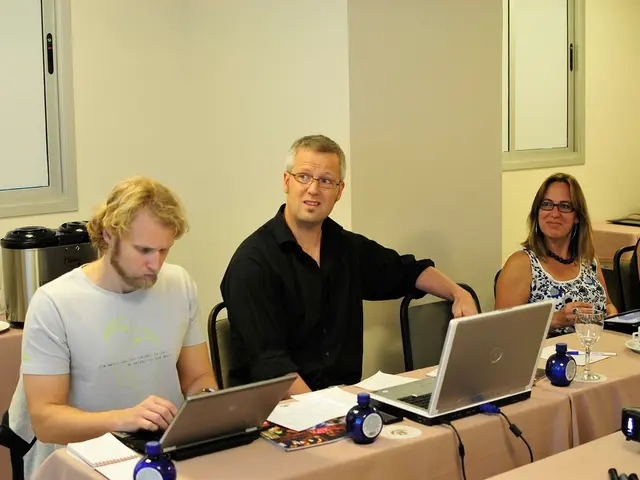DFB Standing by Ittrich Amid Hertha Fan's Death Threats and Abuse
Hertha BSC, a second-division soccer club, has come out strongly opposed to the vile and unacceptable death threats and insults directed at referee Patrick Ittrich from some of their very own supporters. Making a statement on the X platform, Hertha BSC expressed their heartfelt solidarity and support for the referee, stating, "The messages sent to referee Patrick Ittrich from our fan camp are unthinkable for us as Hertha BSC."
The club, in no uncertain terms, outright condemned such inhumane behavior, adding, "No one should jeopardize their dignity, no matter the circumstance. We highly regret the vile messages that referees or players receive, and implore everyone to uphold civility in their online interactions."
Ittrich himself took to his Instagram account to report verbal abuse and a death threat after the second-division match between Hertha BSC and VfL Osnabrück that ended in a scoreless draw on Saturday. According to the video footage, he had issued a red card to Berlin's Florian Niederlechner during the game. Ittrich made it known that he wanted to raise awareness about these attacks instead of simply accepting them without comment. Notably, the author of the death threat has later reached out to Ittrich in apology.
Related Articles:
Of Note:
- Death threats and hate speech towards referees can have devastating consequences beyond just the psychological toll on the individuals involved. They can also erode the trust that’s essential for the smooth functioning of the game and potentially compromise the safety of players and officials alike.
Clubs like Hertha BSC, along with sporting organizations such as the DFB, recognize the gravity of such situations and the importance of maintaining integrity and mutual respect among players and officials, regardless of the heat of the moment on the pitch. Fans are reminded to exercise common sense and civility in their online interactions, as social media platforms should never be seen as a legal vacuum.
- Hertha expresses their deepest regrets for the vile messages directed at referee Patrick Ittrich, calling on fans to display maturity and empathy online.
- The controversy surrounding referee Ittrich stemmed from his issuing a red card to Florian Niederlechner of Hertha BSC during a recent second-division match.
- Ittrich's decision to publicize the death threat and abuse received was motivated by his desire to promote a civilized environment on social media platforms.
- Hertha BSC, like many clubs and organizations, believes that referees and opposing players should always be treated with utmost respect, despite any disagreements that may arise during games.
The DFB, football's governing body in Germany, has been among the organizations actively addressing hate speech and death threats against referees by imposing penalties and implementing educational initiatives. The focus is on creating a safe and respectful environment for referees and ensuring sanctions against those found guilty of these offenses.
Source:
Enrichment Data:
In recent years, soccer clubs and governing bodies have adopted various strategies to counter hate speech and death threats against referees on social media platforms. While actions may vary depending on the specific context and organizations involved, some common strategies include:
- Investigations and Legal Actions:
- Real Madrid and La Liga can launch investigations into referees' personal lives and even companies in response to harassment or death threats, as with the case of Munuera Montero[1].
- UEFA and FIFA may choose to impose disciplinary actions against involved fans and clubs for hate speech or death threats.
- Sanctions Against Fans:
- Real Madrid has identified and expelled fans who made racist or insulting comments, such as against Lamine Yamal[2].
- Public Statements and Awareness Campaigns:
- Javier Tebas, La Liga's president, has spoken out against hate speech and racism, emphasizing the need to confront these serious issues.
- Support for Referees:
- GAA (Gaelic Athletic Association) realizes the psychological impact of verbal and physical abuse on referees and implements programs to support their mental health and well-being.
- Media and Public Scrutiny:
- Media outlets can contribute significantly to the issue of hate speech by properly reporting and highlighting incidents of abuse and death threats, as seen with Michael Oliver[4].
- Educational Initiatives:
- GAA establishes programs to combat the culture of abuse, aiming to apply stricter disciplinary measures and promote a safer environment for referees.
These efforts represent a collection of legal, disciplinary, and educational strategies aimed at lessening the impact of hate speech and death threats on referees, resulting in a more respectful and secure environment for everyone involved.
- Real Madrid and La Liga demonstrate proactive responses by investigating referee abuse and death threats.
- UEFA and FIFA may take disciplinary actions to curb hate speech within their soccer communities.
- Club presidents like Javier Tebas promote awareness and initiate legal actions to address specific hate speech incidents.
- GAA, like other soccer associations, supports referees' mental health and well-being, ensuring they can perform optimally.
- Media outlets play a vital role in motivating positive change by responsibly covering incidents of hate speech and abuse.
- Educational initiatives empower soccer associations to curb the culture of abuse and establish stricter disciplinary measures for offenders.








